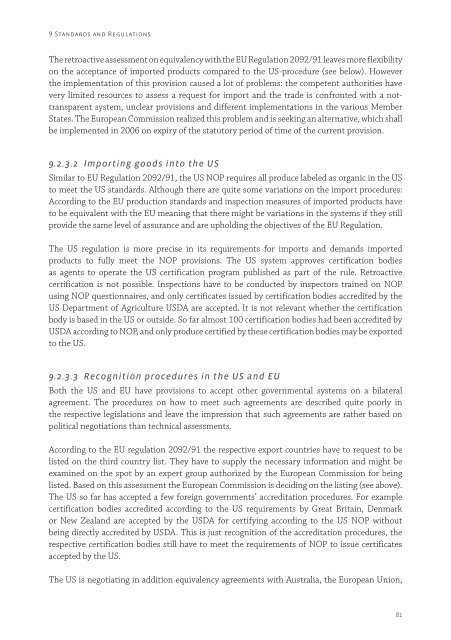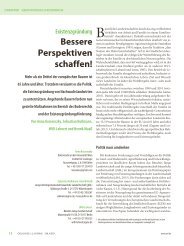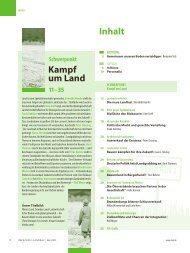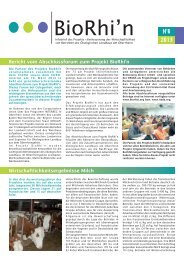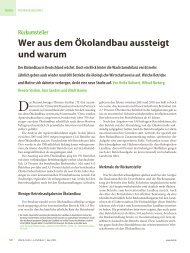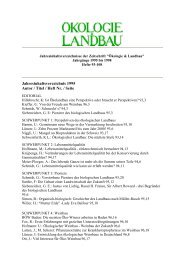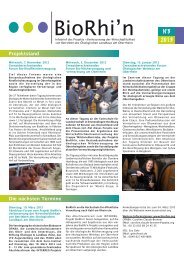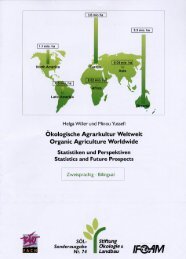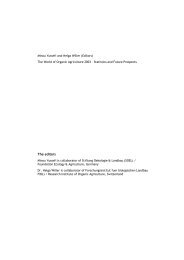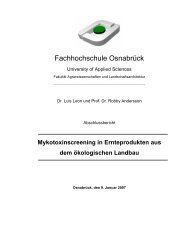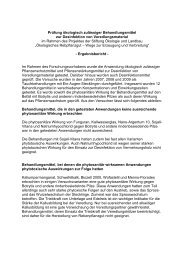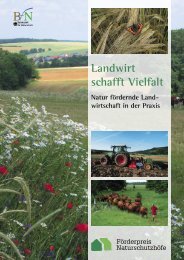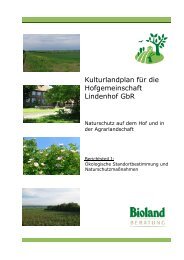the world of organic agriculture - Organic Eprints
the world of organic agriculture - Organic Eprints
the world of organic agriculture - Organic Eprints
You also want an ePaper? Increase the reach of your titles
YUMPU automatically turns print PDFs into web optimized ePapers that Google loves.
9 Standards and Regulations<br />
The retroactive assessment on equivalency with <strong>the</strong> EU Regulation 2092/91 leaves more flexibility<br />
on <strong>the</strong> acceptance <strong>of</strong> imported products compared to <strong>the</strong> US-procedure (see below). However<br />
<strong>the</strong> implementation <strong>of</strong> this provision caused a lot <strong>of</strong> problems: <strong>the</strong> competent authorities have<br />
very limited resources to assess a request for import and <strong>the</strong> trade is confronted with a nottransparent<br />
system, unclear provisions and different implementations in <strong>the</strong> various Member<br />
States. The European Commission realized this problem and is seeking an alternative, which shall<br />
be implemented in 2006 on expiry <strong>of</strong> <strong>the</strong> statutory period <strong>of</strong> time <strong>of</strong> <strong>the</strong> current provision.<br />
9.2.3.2 Importing goods into <strong>the</strong> US<br />
Similar to EU Regulation 2092/91, <strong>the</strong> US NOP requires all produce labeled as <strong>organic</strong> in <strong>the</strong> US<br />
to meet <strong>the</strong> US standards. Although <strong>the</strong>re are quite some variations on <strong>the</strong> import procedures:<br />
According to <strong>the</strong> EU production standards and inspection measures <strong>of</strong> imported products have<br />
to be equivalent with <strong>the</strong> EU meaning that <strong>the</strong>re might be variations in <strong>the</strong> systems if <strong>the</strong>y still<br />
provide <strong>the</strong> same level <strong>of</strong> assurance and are upholding <strong>the</strong> objectives <strong>of</strong> <strong>the</strong> EU Regulation.<br />
The US regulation is more precise in its requirements for imports and demands imported<br />
products to fully meet <strong>the</strong> NOP provisions. The US system approves certification bodies<br />
as agents to operate <strong>the</strong> US certification program published as part <strong>of</strong> <strong>the</strong> rule. Retroactive<br />
certification is not possible. Inspections have to be conducted by inspectors trained on NOP<br />
using NOP questionnaires, and only certificates issued by certification bodies accredited by <strong>the</strong><br />
US Department <strong>of</strong> Agriculture USDA are accepted. It is not relevant whe<strong>the</strong>r <strong>the</strong> certification<br />
body is based in <strong>the</strong> US or outside. So far almost 100 certification bodies had been accredited by<br />
USDA according to NOP, and only produce certified by <strong>the</strong>se certification bodies may be exported<br />
to <strong>the</strong> US.<br />
9.2.3.3 Recognition procedures in <strong>the</strong> US and EU<br />
Both <strong>the</strong> US and EU have provisions to accept o<strong>the</strong>r governmental systems on a bilateral<br />
agreement. The procedures on how to meet such agreements are described quite poorly in<br />
<strong>the</strong> respective legislations and leave <strong>the</strong> impression that such agreements are ra<strong>the</strong>r based on<br />
political negotiations than technical assessments.<br />
According to <strong>the</strong> EU regulation 2092/91 <strong>the</strong> respective export countries have to request to be<br />
listed on <strong>the</strong> third country list. They have to supply <strong>the</strong> necessary information and might be<br />
examined on <strong>the</strong> spot by an expert group authorized by <strong>the</strong> European Commission for being<br />
listed. Based on this assessment <strong>the</strong> European Commission is deciding on <strong>the</strong> listing (see above).<br />
The US so far has accepted a few foreign governments’ accreditation procedures. For example<br />
certification bodies accredited according to <strong>the</strong> US requirements by Great Britain, Denmark<br />
or New Zealand are accepted by <strong>the</strong> USDA for certifying according to <strong>the</strong> US NOP without<br />
being directly accredited by USDA. This is just recognition <strong>of</strong> <strong>the</strong> accreditation procedures, <strong>the</strong><br />
respective certification bodies still have to meet <strong>the</strong> requirements <strong>of</strong> NOP to issue certificates<br />
accepted by <strong>the</strong> US.<br />
The US is negotiating in addition equivalency agreements with Australia, <strong>the</strong> European Union,<br />
81


